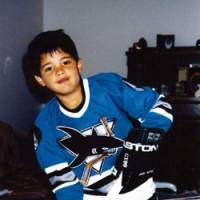In his first full NHL season, San Jose Sharks right wing Devin Setoguchi has established himself as a formidable offensive force for the league's top team.
Before the start of the 2008-09 season, first-year Sharks coach Todd McLellan, a former assistant coach for the Detroit Red Wings, opted to put Setoguchi on the team's first line alongside two standout veterans — Joe Thornton, a center, and left wing Patrick Marleau, the captain.
The move paid off.
The Sharks went 9-0-1 over their first 10 home games at HP Pavilion, which is affectionately referred to as the Shark Tank. They went 32-5-4 at home this season. And they wrap up the regular season with a road game against the Los Angeles Kings on Saturday.
San Jose (53-16-11) has earned 117 points and will enter the playoffs as one of the favorites to capture Lord Stanley's Cup.
Detroit, the reigning champion, is a legitimate contender again, possibly the team the Sharks will meet in the Western Conference finals if both teams advance to the penultimate round of the playoffs.
According to Setoguchi, the Sharks ought to keep the same approach they've had since Day One.
"I think we've got to keep going and doing the little things right," he told The Japan Times by telephone from San Jose, Calif., before a recent morning practice.
"We need to continue to work as hard as we can in every game. If we work hard, our skills will take over."
Exhibit A: The Sharks are 6-3-1 over their past 10 games.
Setoguchi, who turned 22 on New Year's Day, is No. 3 on the team in points, with 30 goals and 33 assists in 80 games. He has a respectable plus-17 rating, 10 power-play goals and three shorthanded tallies.
Thornton leads the team with 85 points (25 goals, 60 assists), while Marleau has 37 goals and 33 assists.
Overall, the Taber, Alberta, product is pleased with his productivity this season.
"When I am playing my best," he said. "I am using my speed as much as I possibly can to get in and out of spots to get to loose pucks. I think I've got a good shot as well. I key on it as much as I can during a game."
McLellan described Setoguchi's shooting skills as extraordinary.
"He's quick," McLellan told NHL.com. "Where he's good is he's tenacious. And he releases the puck. He's prepared to shoot it all the time, which when you put a young player on a line with two dominant bodies like Joe and Patty, a lot of times they're dishing it off and not prepared to take the puck and go with it. . . . They want him to shoot. So it works well for him and he's learned how to use that."
That's been evident all season. In the season's first 40 games, Setoguchi had 19 goals and 21 assists. Over the past 10 games, he has four goals and three assists — solid numbers — and a good sign with the playoffs just around the corner.
Setoguchi has also learned the value of paying attention to details during pregame meetings.
"We always do a goalie report before every game," was the way Setoguchi described a key element of those meetings.
He added: "So we kind of know what to expect before every game. In a game, it happens so quickly, so you have to read the goalie and get the shot off as quick as possible."
I asked Setoguchi to describe the thought process behind taking a shot, and he blurted out these words: "It's a spur-of-the moment (thing) during the game. You've got to make it count."
So who's the toughest goalie you've ever played against?
"Probably (New Jersey's) Martin Brodeur," he said, referring to the league's all-time leader in regular-season victories. "He's a great goalie and if you get a chance on him you've got to make sure you put a good shot on net or else he'll make a good stop."
| * * * * * |
The Sharks selected Setoguchi with the eighth overall pick in the 2005 NHL draft. Team officials believed his offensive ability would translate to big numbers at the next level.
In the minors before joining the big club, Setoguchi proved he could get the job done. In 189 games, he scored 105 goals and amassed 212 points, playing for Saskatoon and Prince George in the Western Hockey League.
Setoguchi made his NHL debut on Oct. 29, 2007, and scored two goals against the Dallas Stars in a 4-2 victory. And they were far from meaningless goals; the words "tying goal" and "winning goal" will forever be etched into Setoguchi's memory.
"I'll never forget that," he told reporters after the game.
Setoguchi played in 44 NHL games last season and finished with 11 goals and six assists.
He also played 23 games for the Worcester Sharks of the AHL and had a 19-point campaign, including eight goals. He began the season on injured reserve after injuring his ankle. All in all, it was an educational process for him, learning to take the good with the bad.
Along the way, Setoguchi's rookie season served as a strong reminder about the importance of the offseason.
"There's a lot of things that you need to work on as this is the top league in the world," he told me. "I am working on my overall strength in the summertime."
But when the puck drops for a game, Setoguchi maintains a singular focus, an intensity that has served him well since he first learned to skate as a youngster in Alberta.
"(I need to) just be focused to play like every game is my last," Setoguchi said. "If you do that, the result is going to be pretty good if you are putting in the effort."
Setoguchi's father, Dale, a second-generation Japanese-Canadian, was an accomplished player in the 1970s. In fact, Dale, originally a defenseman, was named the Alberta Junior Hockey League's MVP as a forward in 1979 while playing for the Taber Golden Suns. He also played one season for the Snow Brand team in Hokkaido.
Dale Setoguchi was an avid supporter of the Philadelphia Flyers, but the first hockey jersey Devin ever owned was a Sharks sweater.
(Of course, the Sharks would like to think of that as a good omen. And why wouldn't they? Setoguchi seems to be a good-luck charm for the team, as evidenced by the success he had — the team went 12-0-1 when he had two or more points — from the get-go in this his first full NHL season.)
"I started playing hockey with my older brother Dennis when we were 6 and 5 years old, so starting Devin also at a very young age was automatic," Dale Setoguchi wrote in an e-mail. "I coached him from the beginning until around the age of 13. I could see he had some real, natural ability and a tremendous desire to play the game. But it wasn't until junior hockey scouts started to notice, that I realized he had potential to play at a high level.
"One of my concerns was if his size was going to be a factor, but luckily he grew to be (182 cm) tall. Once he was drafted by the San Jose Sharks, his dream to play in the NHL was within reach."
Setoguchi grew up on a 283-hectare potato farm in a small town called Taber, in southern Alberta. It was there where he learned hockey pucks, not potatoes, would be his meal ticket.
At the time, he also developed a strong admiration for fellow Japanese-Canadian Paul Kariya, who broke into the NHL in the 1994-95 season with the Anaheim Mighty Ducks and has notched 384 career goals. The veteran left wing, now a member of the St. Louis Blues, has been sidelined since November following surgery on his left hip.
"Growing up, I just always wanted to be like him," Setoguchi said of Kariya.
And that's why it's a big deal for him to follow Kariya's career path and to play against him in the NHL.
"No, I never talked to him before, but just growing up, it's just one of those things. I'm half-Japanese, he's half-Japanese. I always liked him as a player," Setoguchi said during our phone conversation. "Of course, I'm going to take pride in my background. Only a handful of players have been able to play in the NHL with that background."
Naturally, San Jose's Japantown residents have been big supporters of Setoguchi since he broke into the NHL. He said he's enjoyed the fans' never-wavering support and doing interviews with the local TV stations and the Bay Area's Japanese print media outlets.
Setoguchi also admitted he hopes to be an inspiration to younger Japanese-American, Japanese-Canadian and, yes, Japanese players from his paternal homeland who have a dream to play in the NHL some day.
"It feels good to have people watching it, following it and hopefully they want to make a career of it," said Setoguchi, who has talked on local TV in San Jose about his grandparents' stay at an interment camp in western Canada during World War II.
But now, with the season swiftly switching gears to playoff mode, Setoguchi is keen to keep the focus on hockey.
"When you step on the ice and play with Patrick Marleau and Joe Thornton, who are two of the greatest players in the game, they have helped me elevate my game and kick-start my career," he said.
"I want to be in the league a long time and I owe a lot to those guys for the success I've had this year."
Grateful and gutsy, he now zones in on the one thought that has defined the Sharks' 2008-09 season: capturing the Stanley Cup.
"We're expected to win," Setoguchi told reporters in November.
The reason?
"We've got a great coach and great players on our team. I know from our GM right down to everyone in our system, they all want to win hockey games," he concluded. "We expect to win. It's a little bit of pressure but we try and strive for excellence."
Excellence. It's an appropriate word to summarize the way Setoguchi has played this season.


















With your current subscription plan you can comment on stories. However, before writing your first comment, please create a display name in the Profile section of your subscriber account page.